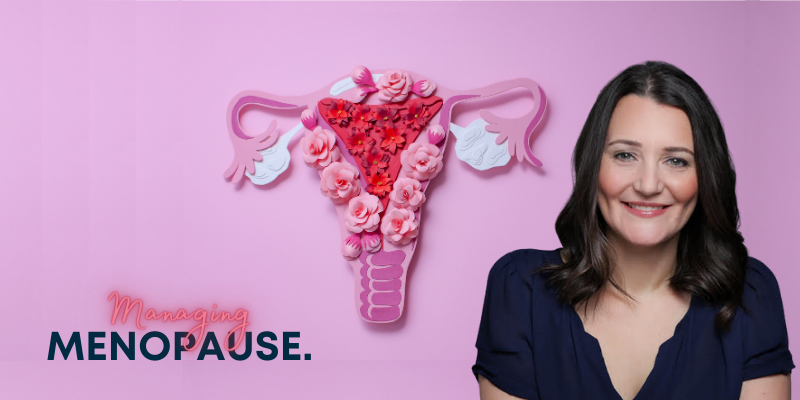Severine’s Personal Journey
“About two years ago I started experiencing some weird changes to my body out of the blue. I was 43 and started gaining weight, experiencing bloating, becoming sweaty and I had very dry eyes. It took me a while to realise that I was experiencing menopause or perimenopause to be correct. I just felt dreadful.”
These are the words of nutritional therapist and health coach Severine Menem, who after being caught off guard by perimenopause symptoms vowed to help other women in similar situations:
“After my realisation, and time spent discovering the best ways to manage my own symptoms, I decided that this was the area I wanted to specialise in.

From that moment on, I focused on helping women over 40 overcome their menopausal symptoms, for some women this can be about losing weight,for others, it can be on managing hot flushes or mood swings... All things that can have a big impact on a person.”
The Power Of Nutrition
Severine had suffered with other health issues earlier in her life. When she was working in financial services in London, she was diagnosed with hypothyroidism which resulted in weight gain, exhaustion, mood swings and depression. After initially taking hormone treatments, she was eventually able to manage her condition through changes to her lifestyle and diet.
Severine has carried this approach through to managing menopause and perimenopause symptoms:
“I knew that by tweaking my diet and my lifestyle, I could really make a difference. That's what I did, and that's how I helped relieve my initial symptoms.

There is a lot that food can do, but you also have to look at the quality of sleep. Additionally, you need to keep moving - which can help reduce stress levels. I also feel that for some people natural supplements can help. Bioelectronics could also be built into a holistic approach to manage menopause symptoms - to help with pain management.”
The Natural BioElectronic Alternative
Severine first became aware of bioelectrical therapy when she changed her lifestyle and took up running:
“Before I had my son, I had started running as part of my lifestyle change. Now that my son is a bit older, I wanted to restart running as I really missed it. I decided to target a half marathon, but when I got to around the 10km mark my knees started hurting. I was looking for natural solutions and this is when I came across NuroKor’s bioelectrical products.”
She goes on to explain in more detail:
“When you have something like knee pain, you’ve got three options. One, you give up, which for me wasn't an option because I really wanted to keep running. Two, you take over-the-counter medication which can help, but the problem with that is that it destroys your good bacteria, your microbiome. I had spent so much time working on it, I didn't want to destroy it just for the sake of being able to run.
And so, the last option, three was trying to find a natural solution to help. This is when I discovered NuroKor and loved it. It was so easy to use with no side effects. It helped me start running again.”

After discovering bioelectrical therapy, Severine realised it could be brought into help with managing menopause symptoms, alongside diet and lifestyle changes:
“There are some menopausal symptoms which could be helped by using bioelectrical therapy. I would recommend using NuroKor for joint pain, muscle pain and tense muscles, cramps during premenstrual syndrome or for low moods as it has a relaxing effect.”
Menopause and the workplace

As well as being a registered nutritional therapist and health coach, Severine has become a menopause trainer for financial organisations, after she realised there was very little awareness about menopause and its symptoms in the workplace.
She goes on to explain: “Although menopause is talked about more than it used to be, I think as women we tend to want to hide things like periods or the menopause because that’s how we've been brought up, which is sad. Nowadays there are so many options of how to deal with menopause, but because women are not being told that something can be done about it, it is often not addressed – particularly in the workplace.”

It is very much Severine’s mission to help raise the awareness of menopause within financial institutions, but also to let women know that they can manage their symptoms naturally, which will then in turn help them at work:
“There are so many natural solutions to help relieve menopause symptoms, such as diet or bioelectronics These can not only make such a difference in the quality of a woman’s lives, but also in the workplace, in their performance and with the interactions with their colleagues.”

So how does she help organisations and individuals? “I work with financial institutions to provide them with menopause help; whether it's awareness, training the manager, supporting the women or creating menopause policies.
The other side of what I do is helping women on a one-to-one basis overcome their menopause symptoms, of which there are about 40 common symptoms. I create a plan which includes nutrition, sleep, movement, stress management and toxins. I then coach them into implementing this plan step by step, very slowly so that they don't get overwhelmed, but they get to where they want to be.”
Opening the conversation
For women who have just started to notice menopausal symptoms, or indeed those who have suffered for a long time, Severine’s words and advice may be welcomed, knowing that natural solutions can be an option to help menopausal symptoms, which can often be uncomfortable and upsetting.
With more and more people having discussions around menopause, maybe this is the time that women can become more open about their symptoms and feel comfortable addressing them rather than hiding them from society.

As discussions continue within the workplace, Severine feels brighter about the future, and how women with menopause can be helped:“We're very lucky because in the last few years menopause is no longer a taboo subject, which is great. There is still a way to go for people and organisations to really understand what it is all about, but we are making progress.
I just want to be here to help women and make them realise that they can manage their symptoms in a way which works for them.”

If you would like to learn more about menopause, common symptoms and Severine Menem’s services visit her www.severinemenem.com or connect with her on Instagram @severinemenem or Facebook.




